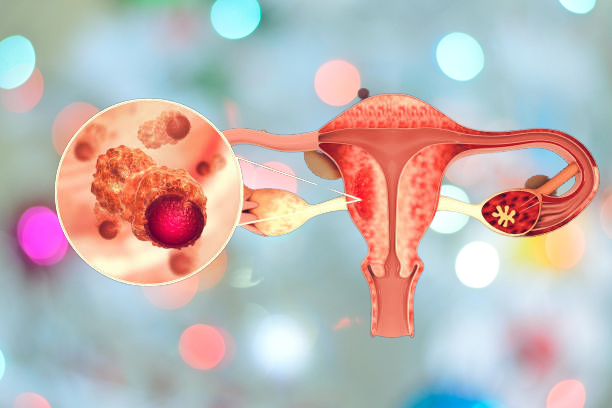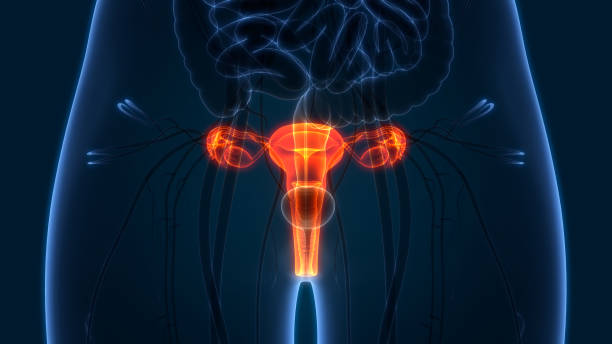Ovarian cancer:what is it?&how to manage?
You or someone you care about has been diagnosed with ovarian cancer?. This will help you understand the disease and how it may affect you.
Women have two ovaries. They are on either side of the uterus. The ovaries are part of the reproductive system that makes and stores eggs.

Ovaries also make a hormones, estrogen and progesterone. The two Fallopian tubes are attached to the uterus. After an egg is released from the ovary, it passes through, one of the tubes to the uterus. The ovaries like close to the peritoneum. The peritoneum is the inner lining of the abdomen that also covers, most of the organs in your abdomen and pelvis.
PREMENSTRUAL SYNDROME: HOMOEOPATHIC THEREPEUTICS
Type of ovarian cancers
Most of cancers begin in the outer layer of the ovary. This is called epithelial ovarian cancer, cancer occurs when cells grow out of control, abnormal cells, continue to divide and may spread to other parts of the body.
Germ cell tumors are another type of ovarian cancer. They start in the cells that make eggs.
Stromal tumors are a third type. They begin in the supporting tissue of the ovaries where hormones are made.

Risk factors
A number of factors May raise your risk of epithelial Ovarian cancer one risk factor is age half of ovarian cancers happen in women aged 63 or older.
Obesity is another risk factor women with a body mass index of 30 or greater have a higher risk.
The risk is also higher for women who have their first baby after age, 35 or who have never had a baby.
Taking hormone therapy with estrogen alone after menopause May raise your risk.
And having a family history of ovarian and certain other cancers can also increase risk.
Symptoms of ovarian cancer
Ovarian cancer may have no early symptoms symptoms of ovarian cancer are often vague when symptoms do appear. They may include pain in the pelvis or abdomen, gas, or bloating, irregular, menstrual bleeding feeling that you always need to urinate constipation and back pain.
However, in most cases these symptoms are caused by conditions that are not ovarian cancer.
stages of ovarian cancer
If you have ovarian cancer, your doctor will need to determine the subtypes of ovarian carcinoma the grade and the stage or progression of the disease to help plan of your treatment. Each grade is based on how different the cancer cells. Look compared to normal ovary cells under a microscope. The higher the grade, the more aggressive the cancer is. Each stage 4 ovarian cancer is based on how far cancer cells have spread from, where they began stage.
In 1st stage means the cancer is only within the ovaries at stage
In second stage,the cancer has spread to other organs, but is still within the pelvis.
In stage 3, cancer has spread beyond the pelvis, to either the peritoneum, or the lymph nodes behind the peritoneum or both.
Stage 4 means the cancer has spread to organs outside the peritoneum. As you deal with a diagnosis of ovarian cancer, continue to talk to your doctor and her Cancer Care team.
Treatment
Treatment for ovarian cancer May remove or destroy the cancer.After treatment, it’s very important to have a follow-up care plan. This includes going to all follow-up appointments. Your doctor will want to check to see if the cancer has returned and check for health problems,Resulting from treatment. You will likely need to see your doctor often after your treatment asked about what kind of schedule you can expect. If you are on any medications continue to take them as prescribed by your doctor.
Take note of any side effects and tell your doctor.
If you had surgery on your ovaries or other treatments follow, any instructions you were given. You may also need to make some of the following healthy lifestyle changes.
Don’t smoke and limit how much alcohol you drink. Both of these activities. May increase your risk of cancer.
Eat a healthy diet with more fruits, vegetables and whole grains, a healthy diet, May reduce the risk of your cancer coming back.
Become Physically, Active daily exercise and activities can help you feel better. It is important to speak with your doctor before starting an exercise plan or making Lifestyle Changes. Keep in mind, that some Cancer Treatments can make you feel very tired. Ask your doctor, what you can do to help you feel less tired. Knowing you have cancer can be overwhelming, you may have worries about things like your condition and how it affects her family.
Treatments and hospital stays medical bills and your job. Fortunately, there are ways to cope with this. Talk to your Healthcare team. They can help you find the support. That’s right for you. The following sources of support can help you cope with your concerns. Social workers. religion leaders. Counselors. And support groups.
Talk to your doctor. If you have any questions about your treatment plan medications or lifestyle changes to help you manage ovarian cancer.
